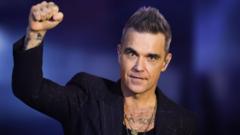This website uses cookies so that we can provide you with the best user experience possible. Cookie information is stored in your browser and performs functions such as recognising you when you return to our website and helping our team to understand which sections of the website you find most interesting and useful.


Robbie Williams has spoken of the "discomfort" he feels when he is approached for photos and autographs.
In a candid Instagram post, the pop star said he can "mask it well", but he feels frightened by social interaction and "panics" when a stranger approaches him.
The singer, 51, also revealed he turned down multiple requests for photos on a recent flight.
But he said he felt "gratitude" for those who tell him they are genuine fans of his, adding: "This isn't a complaint, it's context."
The former Take That singer said that during the domestic flight across the US, one fan handed him a "lovely note" and then asked for a photo.
Williams said he then wrote a note back.
"I explained I'd been up since 04:30, had two hours' sleep, and wrangled four kids through the airport. I've got bags under my eyes and I'm dealing with anxiety," he said on social media.
"I explained that if they came and took a photo with me, my anxiety would spike - because then the whole cabin would start wondering who I am."
He said another fan then asked for a photo, so he wrote a similar note on the back of his plane ticket.
"As I was writing that one, another passenger walked up and just asked outright for a photo," he said. "I obliged."
Williams said he saw it as "being of service" and that, if it made someone happy, he would do his best to facilitate.
"Still... I think there needs to be a caveat," he added.
Williams said there was an "unspoken law" that celebrities should be accessible 24/7, and that he should greet all strangers "like you're the mayor of the best town".
"But that thinking's off," he said.
He said he thought more than half of people who approached him could not name one of his albums.
But he added that if people were actually his fans, he wanted to hear it.
"That means a lot. I'll make time. I've got gratitude for that," he said.
But he then asked whether there should be a limit on how many people can access celebrities in a day.
"Every interaction - with strangers or even people I know well - fills me with discomfort," he said.
"I mask it well. But social interaction still frightens me," he added. "Every time a stranger approaches - and they are strangers - I panic."
Williams reiterated that he was not complaining about the attention his stardom brought him, writing: "I'm not moaning. This is a problem I'd rather have than not."
He added: "I'm not saying don't ask. You can. What I am saying is: let people be people."
Williams rose to fame as part of the boy band Take That in the early 1990s, before launching a successful solo career which saw him release hits such as Angels, Millennium and She's The One.
He had a well-documented struggle with depression and substance abuse in his 30s, and has spoken in the past about his mental health problems.
His rise, fall and resurgence were recently told in the biopic Better Man, in which he is portrayed by a chimpanzee.
Williams described the film, which does not shy away from dealing with the more difficult chapters of his life, as "the greatest hits of my trauma for the TikTok generation".
In the comments section under his Instagram post, people praised Williams for his openness and honesty.
"Everyone is entitled to their boundaries," wrote one user.
"No human is entitled access to another human, famous or not," wrote another. "I think celebrities need to start normalising saying no to fans."
If you have been affected by any of the issues raised in this story, information and support can be found at the BBC's Action Line.



 Africana55 Radio
Africana55 Radio 
